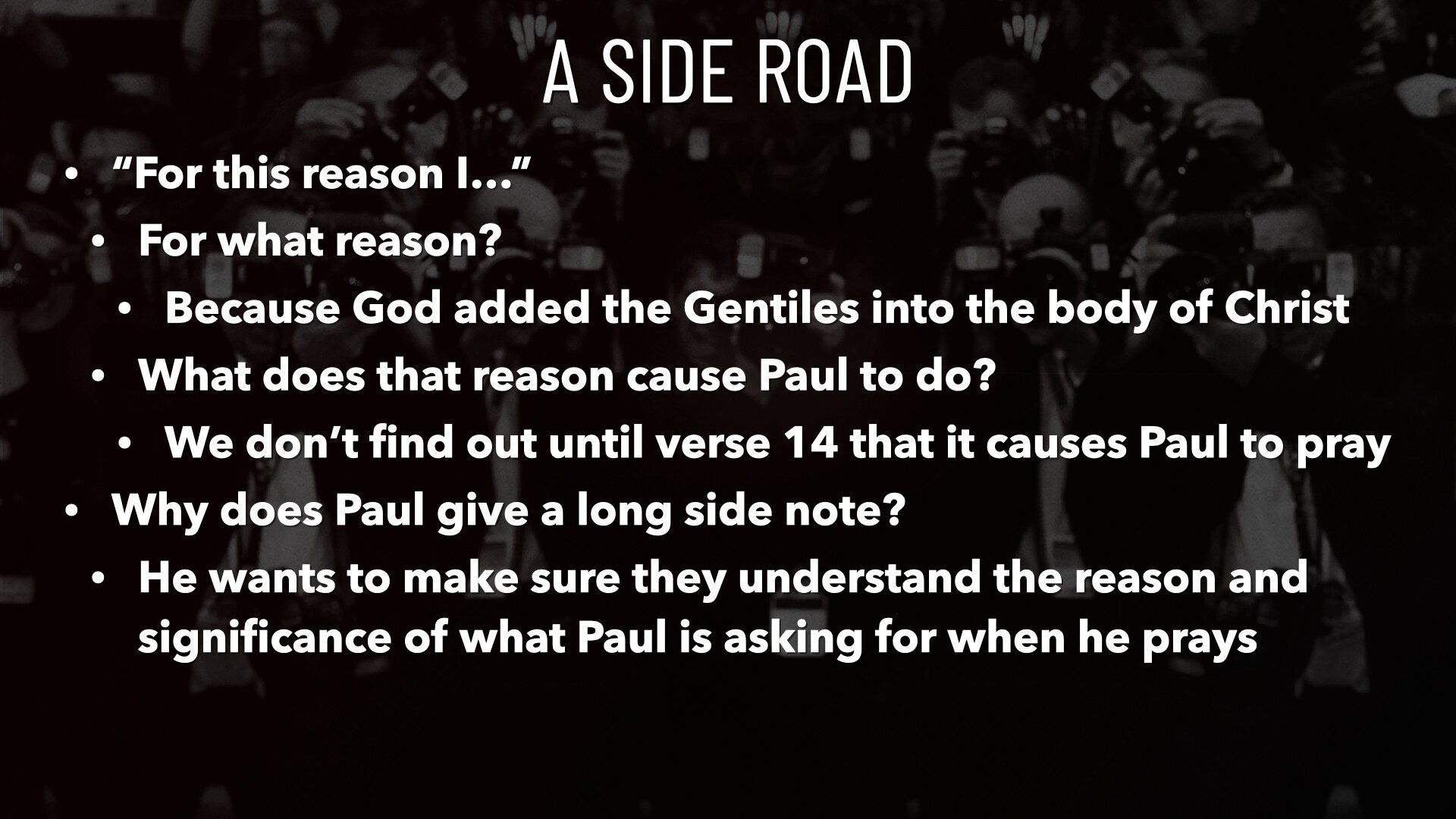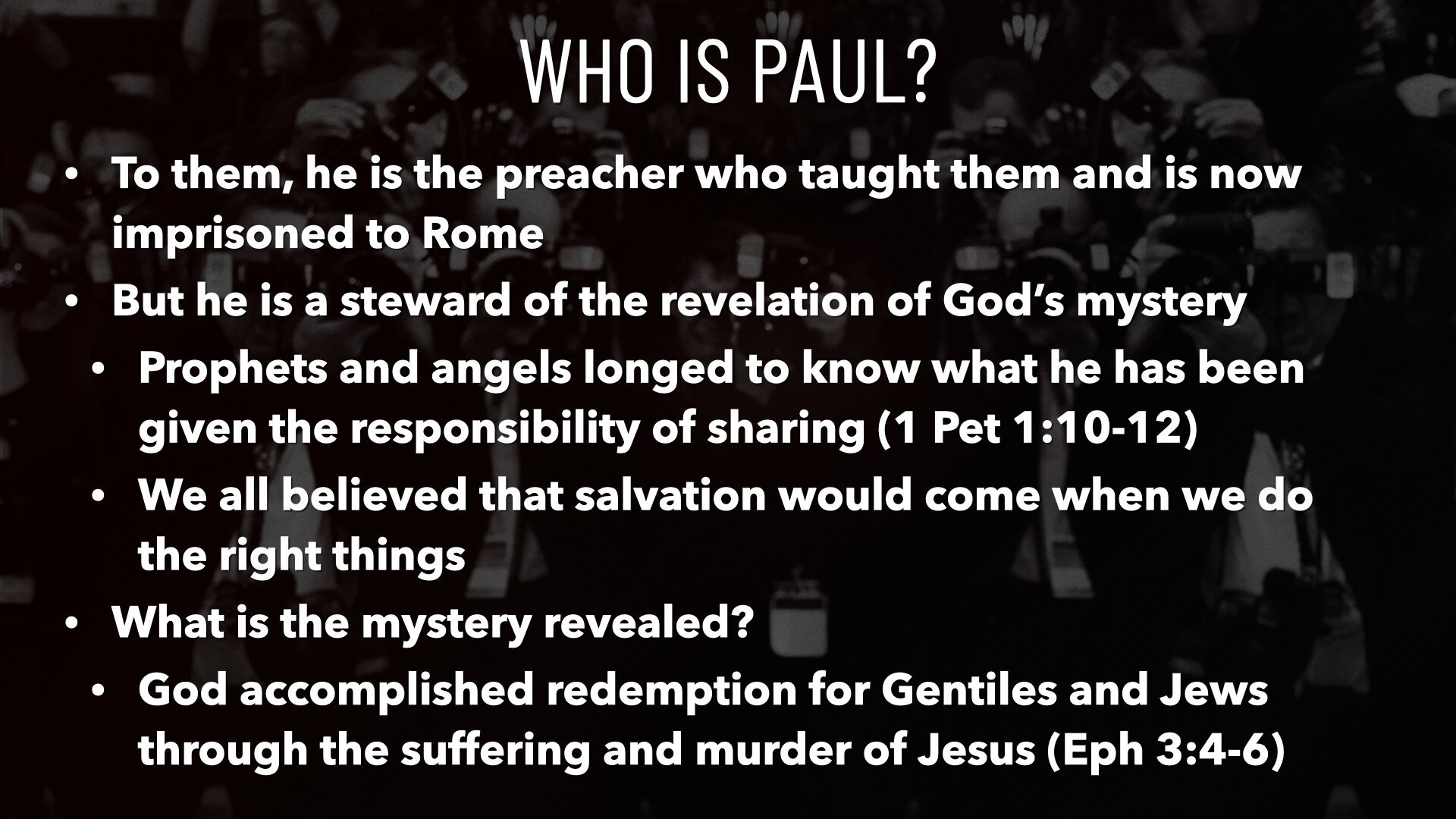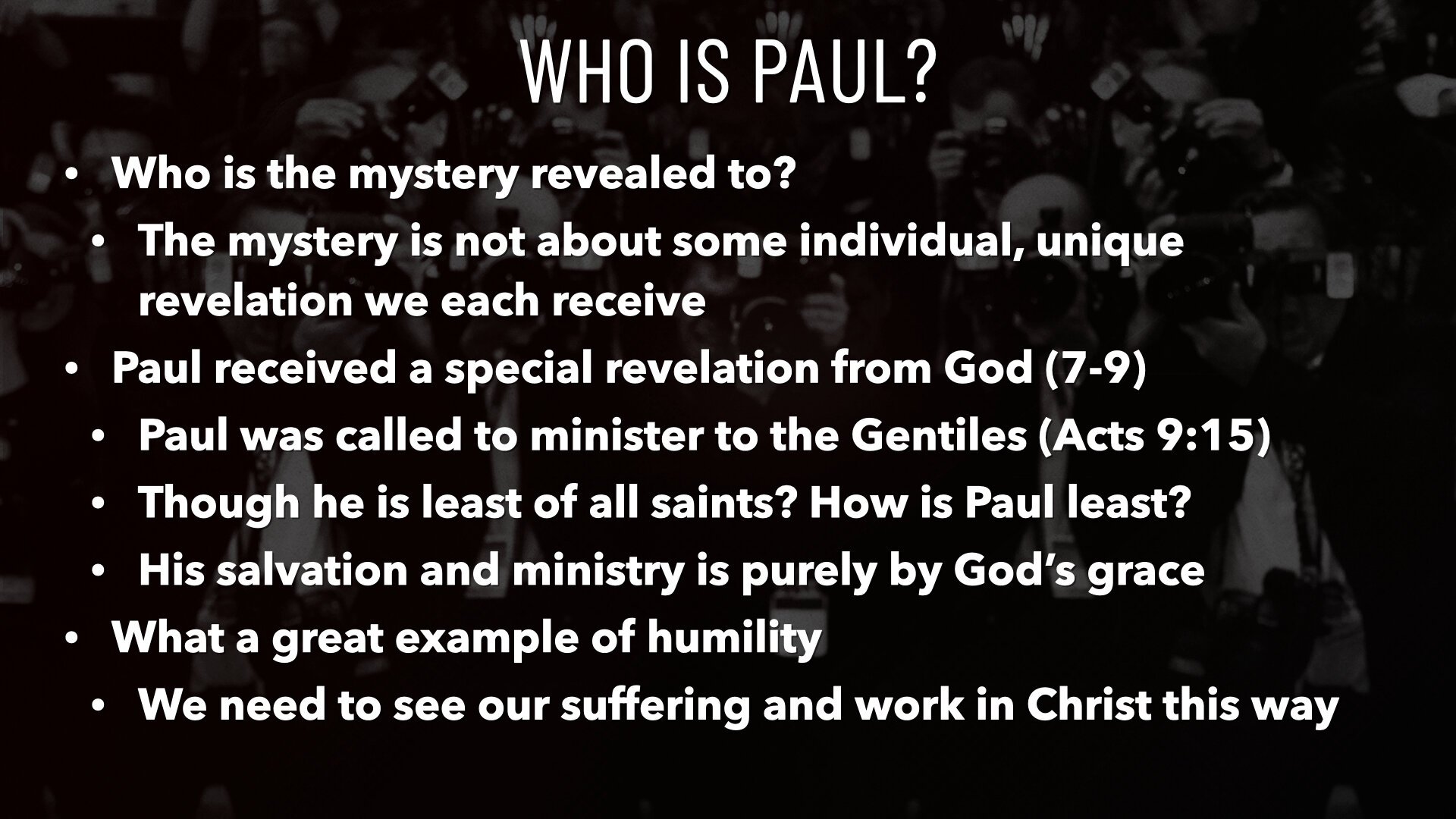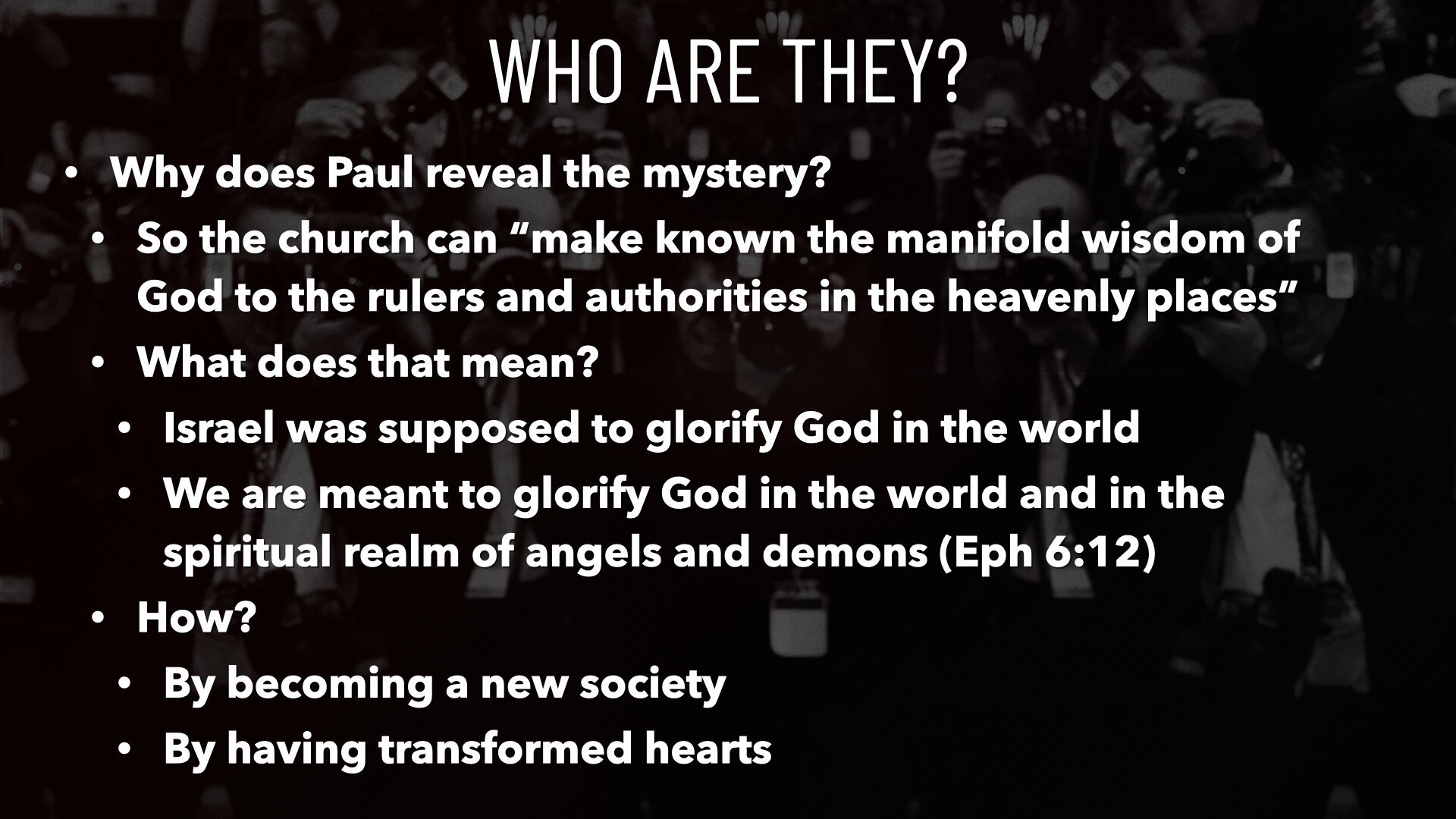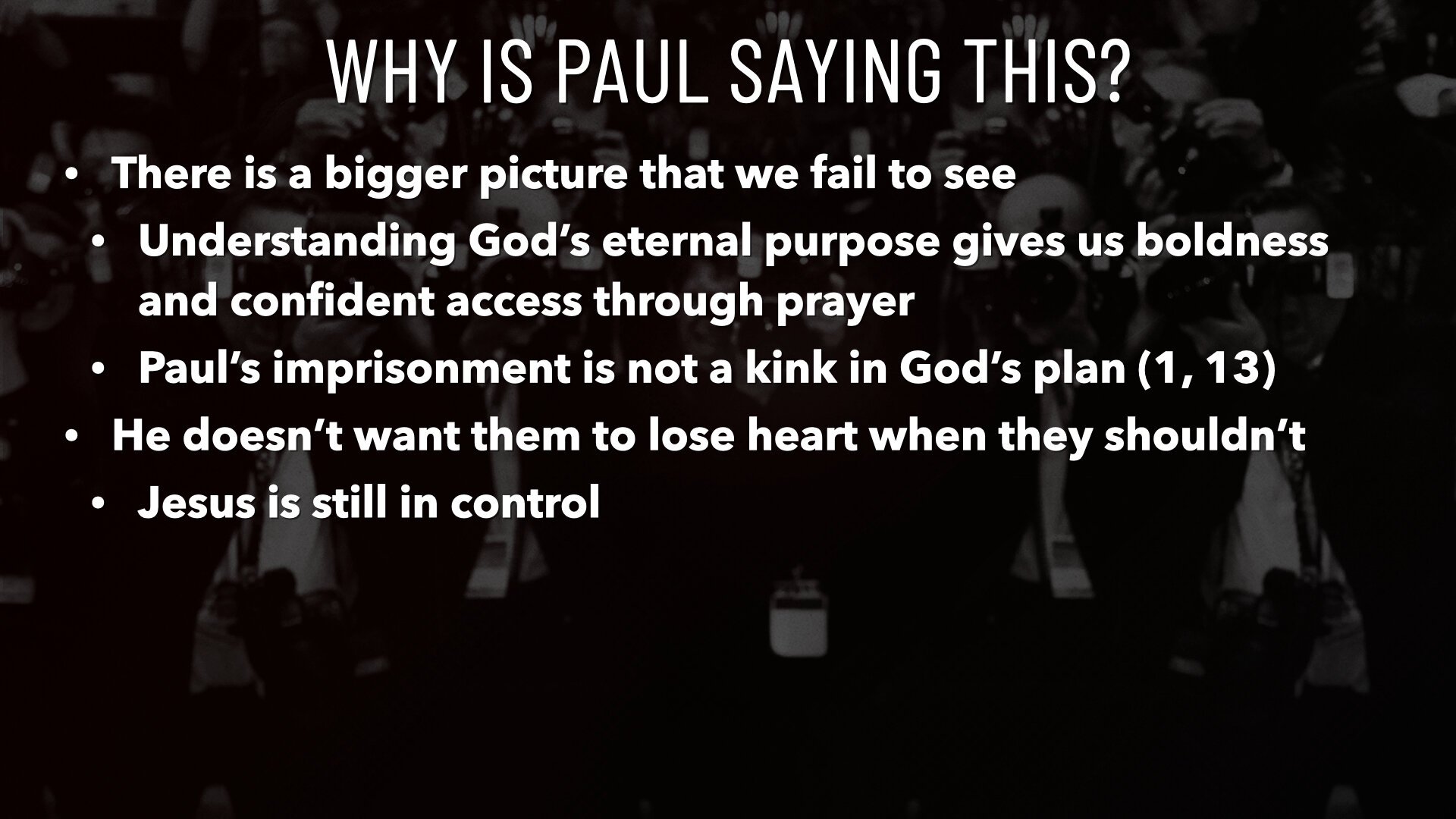Don't Lose Heart (Ephesians 3:1-13)
Paul has blown us away with great news about what God has done for us in the first two chapters of Ephesians. It's so encouraging to hear that God has poured out his love on us, even when we were dead in our sins. God still wants us and he has made a way for us to be near him no matter how far away we have been in the past.
"For This Reason"
As we continue our study in Ephesians, we see why Paul just explained everything he did in the first two chapters.
Ephesians 3:1 (ESV) --- 1 For this reason I, Paul, a prisoner of Christ Jesus on behalf of you Gentiles---
Notice that he breaks his train of thought. He says, "For this reason I..." There is no verb explaining what he does "for this reason." The verb doesn't come in until verse 14, where he reveals that he is bowing his needs before the Father. For this reason, Paul prays to God. What is the reason, and what does his prayer look like? Also, why does he say all of this other stuff in between? Time will not allow us to answer all of these questions in depth this evening, but we will answer them and find a critical message we can take with us this week.
What Reason?
What is the reason? This is the most straightforward question to answer. When Paul says, "For this reason," he refers to the truths he just explained in chapter 2. Because Jews and Gentiles are joined together into a holy temple in Jesus, he is praying. This grand truth of the church being the body of Christ has moved Paul to prayer.
Why Pray?
What Does He Pray For? Paul wants the temple of God to be strong and glorious. Think about how important it is that the temple of God grows bigger and stronger than anything else on earth. If God is going to be glorified in his temple, God's temple must be strong. We are joined together, and we need every other part to be strong. That's going to be the basis of his prayer in verses 14-21. He will explain more about how we can all be strengthened in chapters 4-6. We learn about his prayer in further detail next week.
Why does he go on a tangent before describing his prayer? Tonight, I would like us to understand this large break in thought that extends from verses 1-13.
Ephesians 3:1--13 (ESV) --- 1 For this reason I, Paul, a prisoner of Christ Jesus on behalf of you Gentiles--- 2 assuming that you have heard of the stewardship of God’s grace that was given to me for you, 3 how the mystery was made known to me by revelation, as I have written briefly. 4 When you read this, you can perceive my insight into the mystery of Christ, 5 which was not made known to the sons of men in other generations as it has now been revealed to his holy apostles and prophets by the Spirit. 6 This mystery is that the Gentiles are fellow heirs, members of the same body, and partakers of the promise in Christ Jesus through the gospel. 7 Of this gospel I was made a minister according to the gift of God’s grace, which was given me by the working of his power. 8 To me, though I am the very least of all the saints, this grace was given, to preach to the Gentiles the unsearchable riches of Christ, 9 and to bring to light for everyone what is the plan of the mystery hidden for ages in God, who created all things, 10 so that through the church the manifold wisdom of God might now be made known to the rulers and authorities in the heavenly places. 11 This was according to the eternal purpose that he has realized in Christ Jesus our Lord, 12 in whom we have boldness and access with confidence through our faith in him. 13 So I ask you not to lose heart over what I am suffering for you, which is your glory.
Before he prays, he wants them to understand who he is, who they are, and why he is saying this before describing his prayer. This is interesting because much of chapters 1-2 have already discussed much of this. It's like Paul wants to make sure they understand what he said before he talks about his prayer for them. They won't understand what he is praying or why he is praying until they fully understand the answers to these three questions.
Who Is Paul?
The first thing Paul wants to talk about is who he is. The Ephesians know who Paul is. He preached there for over three years, and he has an intimate relationship with the brethren there. So why does he feel the need to redefine himself? They may not understand who he is. To them, he is the preacher who taught them the gospel and is now imprisoned in Rome, but he is more than that.
Revealer Of A Mystery (3:2-6)
Ephesians 3:2--6 (ESV) --- 2 assuming that you have heard of the stewardship of God’s grace that was given to me for you, 3 how the mystery was made known to me by revelation, as I have written briefly. 4 When you read this, you can perceive my insight into the mystery of Christ, 5 which was not made known to the sons of men in other generations as it has now been revealed to his holy apostles and prophets by the Spirit. 6 This mystery is that the Gentiles are fellow heirs, members of the same body, and partakers of the promise in Christ Jesus through the gospel.
In verse 2, Paul starts to describe his stewardship. A steward is a servant who is given responsibility for a large part of his master's property. In this case, Pauls' stewardship is revealing the mystery of the gospel to all the Gentiles. Many people would struggle with this idea of a mystery. But notice that Paul is revealing this mystery. Throughout scripture, the Old Testament is wrapped in mystery. In 1 Peter 1, we learn that the prophets and the angels longed to understand what God was foretelling. They couldn't fully understand how God would fulfill his promises or what God was promising.
No one on earth could understand what God was planning. When Jesus came, people were still perplexed. It was a mystery. We all believed that salvation would come through doing the right things. We thought we would have to save ourselves. The mystery revealed that we are loved and accepted by God even though we are sinful, terrible people. The mystery is that God accomplished our redemption through the suffering and murder of Jesus. God always works for his glory through the same suffering that the enemy wants to use to defame him.
This was all a mystery to mankind. But Jesus chose Paul to reveal this mystery to the Gentiles. Notice what he says in verse 4, "When you read this, you can perceive my insight into the mystery of Christ." This is no longer a mystery that hasn't been revealed. All of us can understand what God has done. Then, he plainly states what the mystery is in verse 6, "That the Gentiles are fellow heirs, members of the same body, and partakers of the promises in Christ Jesus through the gospel." The mystery is God's plan to bring those who were the farthest away from God to God. God brought us into his family and made us a part of Christ's body. We know that all of the spiritual blessings brought to the Jews in Christ are our spiritual blessings because Paul and the rest of the apostles and prophets have revealed it to us by the Spirit.
This is the pattern we find consistently in scripture. Paul was not saying that we are all given some special gift of revelation. None of us are waiting to hear from God some special message that will explain a mystery. Everything God wanted to reveal has been revealed and written down so that we can understand it. So many people today are looking for some additional revelation. They trust in men who tell them to listen for God to speak to them or wait for God to make them feel something. That's not the way we have God's will revealed to us. The apostles and prophets are where the whole revelation comes from. It's written down for us to understand when we read it and grow in faith.
The Least (3:7-9)
The following description that we get of Paul is his explanation of how he received this revelation.
Ephesians 3:7--9 (ESV) --- 7 Of this gospel I was made a minister according to the gift of God’s grace, which was given me by the working of his power. 8 To me, though I am the very least of all the saints, this grace was given, to preach to the Gentiles the unsearchable riches of Christ, 9 and to bring to light for everyone what is the plan of the mystery hidden for ages in God, who created all things,
Here we see that Paul wasn't selected because he was so righteous or intelligent enough to figure out what God was doing. God was gracious to him, and he gave him this ministry. This was the work of God. Paul refers to his conversion where Jesus says that he has made Paul a minister to preach the gospel to the Gentiles (Acts 9:15). Then, Paul says that he was chosen even though he is the very least of all the saints. Isn't that interesting? Possibly the greatest follower of Christ to have ever lived considers himself the least of all the saints. That lines up perfectly with what we have been learning in Matthew 16-20. He sees everything he is as a gracious gift given to show God's mercy and grace. He was the least, but Christ made him the most prominent member. Paul is the one Jesus chose to bring to light God's plan. He didn't choose Peter, James, or John. He chose Paul. He wrote 13 of 27 New Testament letters that millions of people have used to learn about this mystery of Christ.
Isn't that an amazing testimony of God's grace? He knew Paul would be the most humble and submissive because he would understand how horrible he was and how much grace was given to him. He loves God much because God forgave him much. Is that true of us?
We often want to consider ourselves great based on our accomplishments, but Paul remains completely humble. He recognizes that whatever he accomplishes is because of Christ working through him. He would have no knowledge or understanding without God's grace. We need that mentality in our work, always. Many preachers, teachers, and elders have the pride and arrogance to think much of their accomplishments. He doesn't feel entitled to preach to the Gentiles. He is not on some "power trip."
This is Pauls' explanation of who he is. He tells them this so they can understand his attitude when he prays. He is not praying because he is the greatest. He is praying because he has been given the stewardship of caring for the Gentiles. He wants to be faithful, and he wants the Gentiles to see how unsearchable the riches of Christ are so that they will not lose heart.
Who Are They? (3:10-11)
The next verse repeats the purpose of the church. This is a repeat of the thoughts found in chapters 1-2 but notice the additional information.
Ephesians 3:10--11 (ESV) --- 10 so that through the church the manifold wisdom of God might now be made known to the rulers and authorities in the heavenly places. 11 This was according to the eternal purpose that he has realized in Christ Jesus our Lord,
God's Wisdom
He says that everyone has been given the revelation of God's work so that the church can make known God's "manifold wisdom." Manifold means many or multifaceted. God's wisdom is on display in the church. It's like a color wheel that shows different colors. God's wisdom is demonstrated in each member of Christ's body. Verse 11 says this was all a part of God's eternal purpose. He planned for us to receive the revelation and become a revelation of God's wisdom, power, and glory.
For Angels and Demons To Know
But I want us to pay close attention to who we display God's wisdom too. In the Old Testament, Israel was given the purpose of revealing God's glory to the world (Deuteronomy 4). Now, God wants the church to reveal God's glory to the rulers and authorities in the heavenly places. What is this referring to? Paul will be speaking to Caesar, but the heavenly places are where spiritual forces of wickedness.
Ephesians 6:12 (ESV) --- 12 For we do not wrestle against flesh and blood, but against the rulers, against the authorities, against the cosmic powers over this present darkness, against the spiritual forces of evil in the heavenly places.
God's eternal purpose is for the church to show angels and demons his glory. The church is not just some club or religious organization. It is a spiritually united, multi-ethnic community that displays God's wisdom, power, and glory for everyone to see. Men and women from every walk of life are joined together in Christ: Gentiles and Jews join together, wicked persecutors join with those they persecuted. The angels watch, and they sing praises to God for his grace.
A New Society
FF Bruce said, "The church is a new society, not just a fellowship. A society where the world can see exhibited what family life, business life, economic practices, and race relations will be like under the healing hand of Jesus' kingship. I love that idea. We are a society intended to become the best of humanity as we serve one another with love.
This makes me wonder, though, what is being put on display when we, as the body of Christ, fail to be radically transformed? If we remain unchanged by the gospel and don't desire holiness, fellowship, good works, and a greater understanding of God, we are defaming God in the spiritual realm. This was God's main issue with Israel throughout the Old Testament. Do we think, "I guess I have to get out of my pajamas and go to church?" Do we think, "I really don't want to stop doing the evil things I've been doing?" How many of us are careless when it comes to the purpose God has given us in life? We should want to fulfill the purpose God has given us as the body of Christ.
Picture having a camera on you at all times to display every aspect of your life (The Truman's Show). If you knew billions of people watched your every move, how would that impact the way you act? Wouldn't that impact the way you think, the way you act, and the way you focus on the truths you believe? The reality is that we are on display before billions of angels every day who watch to see how God has transformed us by his grace. They want to see how we will handle the suffering we go through in life. There is never a trial in life that goes unnoticed.
Job is an illustration of what this is talking about. God is putting the faith of Job on display to show the faithfulness of his servant. Why? Because God needs to reveal his glory. This is the only way to unite heaven and earth under God and Christ. We must all unite in praising and glorifying God, who is all-wise and powerful.
Why? (3:11-13)
Ephesians 3:11--13 (ESV) --- 11 This was according to the eternal purpose that he has realized in Christ Jesus our Lord, 12 in whom we have boldness and access with confidence through our faith in him. 13 So I ask you not to lose heart over what I am suffering for you, which is your glory.
This last section tells us the reason for the "side note." Paul doesn't want them to lose heart. He wants them to see his suffering and understand what is going on. To the outside observer, Christ is suffering a great defeat. But in the spiritual realm, God is dominating the enemy through Paul's boldness and access with confidence. It looks like Paul is in prison, but he is free in Christ. His faith makes his suffering a display of God's glory. He trusts in God and Jesus. He believes what he does not see.
Prisoner of Christ (3:1, 13)
If we go back to the beginning, we see that the "side note" begins by stating that he is a prisoner of Christ Jesus on behalf of you Gentiles. Consider all of the implications in this description. Paul is a prisoner, not of Rome or any government. He is a prisoner of Christ. Jesus is the one who has imprisoned him. If Jesus did not want him to be in prison, he would not be in prison. If Jesus wanted him free, he would be free. Paul recognizes that, and he says that he is there "on behalf of you Gentiles."
There are two ways we could take this. Paul is in prison because he preached the gospel to the Gentiles, and the Jews hated him for it. That is true. But it could also be that Paul is in prison to help the Gentiles. It may be that Jesus has some purpose in putting Paul in prison. Maybe his suffering in prison will help the Gentiles in some way. Which is it? Both. Verse 13 has this same idea. Notice how it is worded.
Ephesians 3:13 (ESV) --- 13 So I ask you not to lose heart over what I am suffering for you, which is your glory.
Paul says that he is asking them not to lose heart over what he is suffering for them, which is their glory. So Paul is in prison to help strengthen them. He experiences the pain and suffering that many Christians must go through with faith in Christ in the first century. Paul is showing them how to suffer with joy. This is what the whole parentheses is about. Paul wants them to understand that he is just a servant fulfilling a purpose for Jesus. They need to keep trusting and follow the example they have in Paul.
Application
As Paul tells them all of this, we might have a hard time relating. We aren't in Ephesus. The preacher who taught us the truth is not about to suffer and die. We aren't demoralized b the rejection of the gospel like they were. But we can still apply these things in our lives.
What Makes Us Lose Heart?
I would like for us to consider what makes us lose heart. Often we have to deal with failures and setbacks that take us down a completely different path than we thought we would go. Suffering and watching suffering in the people we love are two of the most challenging parts of life. It's easy for us to relate to these Christians in that way. Think about how these trials affect our hearts. To lose heart is to lose a desire and a drive to work in the kingdom. Paul can see that coming, and he wants to help them avoid becoming demoralized or disheartened. Being demoralized or disheartened causes the body to shrink back and falter. They need strength through understanding precisely what is going on in the trials. We need that same strength. We need the strength to see all that God has done to have faith that God is working in the current trial for his own glorification.
What Gives Us Hope?
Paul wants them to understand the attitude he takes into prayer. Notice how his prayer is described as having the boldness and access with confidence through our faith in him. Paul points out that his prayers aren't going into a file cabinet somewhere. He is boldly standing before the throne of God with complete access as he prays for them and their strength. That, alone, is a great message that we find in this text, but there is so much more.
Conclusion
We have seen how Paul's letter is intended to give the Ephesians light in a dark time. Paul wants them to see that he is Christ's prisoner. Even in his prison cell, he still has access to the most important relationship of all, God our Father. He is also able to display the manifold wisdom of God in heavenly places. Paul is center stage so that all can see how incredible God's mercy is. It has the power to transform the least of mankind into a great faithful servant of God. Don't we want to imitate Paul and become monuments of God's wisdom in giving the gospel? Now is our opportunity to show faith for everyone to see God's glory. If you believe in Christ, give him glory by suffering with persistent faith that Jesus is in control, and he can work all things together for the good of those who love him.


